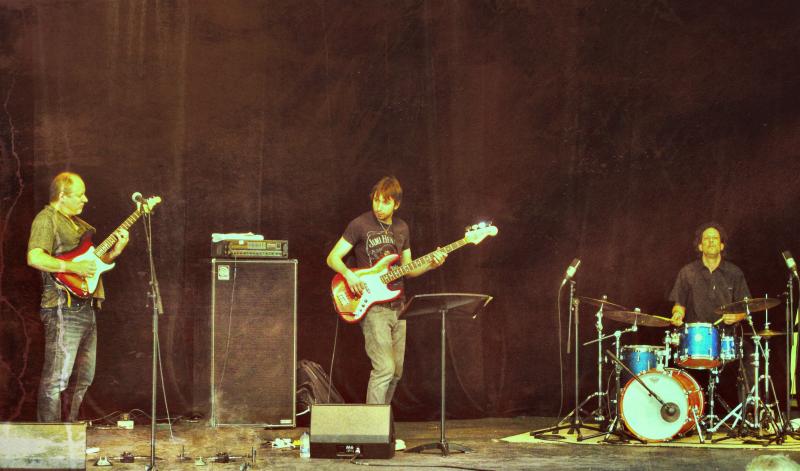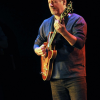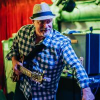Home » Jazz Articles » Take Five With... » Take Five with Wayne Eagles of trio \ DEF
Take Five with Wayne Eagles of trio \ DEF

Wayne Eagles is Canadian guitarist/educator known for his unique guitar style, which incorporates diverse influences from textural soundscapes and free jazz to old school fusion and progressive rock. Wayne has played live and in the studio with a long list of local and internationally known musicians including Adam Nussbaum, Ken Rosser, Lee Fish, Rob Frayne, Mike Milligan and T Bruce Wittet. He is a long-time performance instructor and ensemble director for the Music program at Carleton University in Ottawa. Wayne's recordings include REGALS -The Double-Duo Sessions (post-production by David Torn; TetraArtist, 2011), Milligan-Eagles Project (featuring Billy Kilson on drums; TetraArtist, 2005), and the solo recording How's Now? (Carleton Sound, 2000). His latest release is trio \ DEF (Drouin/Eagles/Froman) featuring bassist Marc-Andre Drouin and drummer Ian Froman (TetraArtist, 2015).
Instrument(s):
Electric & acoustic guitar
Teachers and/or influences:
I consider David Torn and Dave Holland mentors; same goes for many of the musicians I'm fortunate to work alongside, as well as past & present faculty of the Music program at Carleton University. In terms of very early influences, after The Beatles and Elton John, inspirations included improvising bands like Focus, Deep Purple, Jeff Beck Group, Band of Gypsys, Return to Forever, Funkadelic, John McLaughlin's myriad groups, prog bands like Gentle Giant and Yes. At a young age, I was fortunate to attend performances by Joe Pass, B.B. King, Oscar Peterson, Herb Ellis, Ella Fitzgerald, Jerry Reed, Weather Report, Johnny Winter and Lenny Breau, among many others. Guitarists John Abercrombie, Allan Holdsworth, Terje Rypdal and Wes Montgomery remain huge inspirations. Of course, I listen to non guitar-oriented music, such as pianist Bobo Stenson, drummer Tony Williams, bassist Steve Swallow, and Miles Davis.
I knew I wanted to be a musician when:
I had such a strong response to listening to music from a young age. My parents were huge music listeners, appreciating every style imaginable. They took me to many concerts from jazz, blues and symphonic to rock, country and flamenco. Of course, they also coordinated my early guitar lessons (starting when I was 8) and remained unwaveringly supportive. George Harrison (The Beatles) and Davey Johnstone (Elton John) band were my initial guitar heroes. Listening and playing music became pretty all-consuming by the time I was 11.
Your sound and approach to music:
I've always worked to have a unique voice on the instrument. That—of course—remains a workin-progress. I remain influenced by a wide-range of music and players, and continue to refine my sound and improve both in terms of proficiency/ability and musical knowledge. I still read musical materials rather voraciously, whether musician biographies or theoretical treatises. My students are obviously a constant source of inspiration, keeping me on my toes and in-the-loop. Perhaps I'd best describe my approach to music as trying to fuse the freedom of sounds and improvisation approaches of the best early jazz/rock with the space/clarity of the European/ECM tradition all filtered through my composition and theoretical approach. Lofty goal, I realize.
Your teaching approach:
My hope is to assist students find and define their musical vision as well and move towards a distinctive sound on their instrument. This of course requires attention to many details: honing a skill set, general musical comprehension, being honest with one's strengths/weaknesses.
Your dream band:
I've been fortunate to work with some incredible musicians over the years, which has certainly been motivating. Case in point, the new trio \ DEF (Drouin/Eagles/Froman) recording: very hard to not be inspired and humbled working with Ian Froman (drums) and Marc-Andre Drouin (bass). Similarly, work with bassist Mike Milligan and drummer Billy Kilson was a genuine learning experience. Ottawa drummer/journalist T Bruce Wittet another important collaborator. As for dream bands, it's hard not to think of many renowned rhythm sections: Steve Swallow / Adam Nussbaum, Jimmy Johnson / Gary Husband, Miroslav Vitous / Jack DeJohnette, Anders Jormin / Jon Christensen...
Road story: Your best or worst experience:
Years ago, I played in a couple of uniquely named pickup bands: Godzilla & the Mukluks, as well as The Morty Bagelman Review. One gig each, thank goodness! Ha! Won't even get into some of the New Year's Eve casualties I've endured.
Favorite venue;
I'm grateful to any venue that supports live music, but—in terms of a fave—many of the jazz and improvised music festivals have tremendous support as do many university showcase venues. Hometown bias? Kailash Mital Theatre at Carleton University with John Rosefield at the board.
Your favorite recording in your discography and why:
I'm very proud of all my recordings; good representations of what I was up to at the time of their release. With my past releases have been jazz/rock and/or free improvisation focused, the latest release—the aforementioned, trio \ DEF (Drouin/Eagles/Froman)—is modern jazz with an emphasis still on interaction/interplay. A logical progression/extension; very proud of it.
What do you think is the most important thing you are contributing musically:
I often find myself the primary composer and leader/producer. So, I encourage collaboration and input (why else use such fine players and engineers?). While I have a strong hope/vision of the end result, I think the magic exists in communication, open-mindedness and willingness to change things up.
Did you know:
While I currently teach a wide range of jazz-influenced improvisation styles, I was the first person to teach rock and blues guitar styles for a Canadian university back in 1992. In addition, I oversee the TetraArtist recording label, formed in collaboration with the Ottawa audiophile company Tetra Speakers.
The first jazz album I bought was:
Joe Pass: Virtuoso (Pablo, 1973), followed by Miles Davis' late-sixties recordings
Music you are listening to now:
David Torn: only sky (ECM, 2015)
Steve Khan: Subtext (Tone Center, 2014)
Carla Bley: Trios (ECM, 2013)
Soft Works: Abracadabra (MoonJune, 2003)
Terje Rypdal: Lux Aeturna (ECM, 2002)
Desert Island picks:
Allan Holdsworth: Sixteen Men of Tain (Gnarly Geezer, 2000)
Weather Report: 8:30 (Columbia, 1979)
Free: Live! (Island, 1971)
Lenny Breau: The Velvet Touch of... Live (RCA, 1969)
Wes Montgomery/Wynton Kelly Trio: Smokin' at the Half Note (Verve, 1965)
How would you describe the state of jazz today:
There's always a ton of tremendous creative music being recorded and performed, though seemingly fewer outlets for having it seen/heard. Of course, recording revenues have diminished as has airplay, while creative music venues and festivals struggle to balance finances with ticket sales. Does appear a more dire situation in North America than overseas. Yet, the quantity of top quality, challenging improvised music being played and released is sure inspiring.
What are some of the essential requirements to keep jazz alive and growing:
I certainly believe cultural funding greatly assists creative music stay vibrant and accessible, be this federal/provincial/municipal support or business subsidies. There's a lot of noise out there, and it is difficult to get heard above the din of pop culture promotion and advertising. I truly believe people will be supportive of artistic endeavours if more exposed to them via media or accessible performances. While perhaps a "grass is always greener" belief, it does appear improvised music and festivals are in good shape in many European countries as culture (seemingly) remains a priority.
What is in the near future:
Working hard to line up tour and festival dates for trio \ DEF in 2016; we're all anxious to continue performing our existing and new material. Feel free to contact us if booking! In addition, I have some trio recordings with Boston-based drummer Lee Fish that are still in need of editing/mixing. I hope to release those soon as well as several Bruce Wayne tracks (my duo with T Bruce Wittet). Also chatting with my colleague, pianist/composer James McGowan, about revising our collaboration. Hoping to get a long discussed project with Adam Nussbaum back in the queue, perhaps a revival of REGALS with guitarist Ken Rosser.
What is your greatest fear when you perform:
I'd say, being ill-prepared. You always want to put your best foot forward, whether leader or sideman. Technical/equipment issues next on the list (especially re: backline gear).
What song would you like played at your funeral:
Hmm... Subject to change, but one of a small handful of tunes that never fail to move me to tears: Joni Mitchell's later symphonic version of "Both Sides Now" or her "Come in From the Cold." The Beatles' "Long and Winding Road" another.
I had the harrowing task of playing John Abercrombie's "Timeless" and Roy Forbes' "If I Was a Raven" at my father's funeral. Bittersweet, indeed.
What is your favorite song to whistle or sing in the shower?
I'm a dreadful singer/whistler, so tend to dream up tune ideas instead!
By Day:
Full-time musician/educator. Did spend a few years as a part-time musician/educator and fulltime dad when our kids were young.
If I weren't a jazz musician, I would be:
Hopefully still involved with arts and culture, perhaps in an administration or educational role.
What motivates you?
The constant goal of improving as a player, composer and producer. Always so much to learn and improve. Will always remain a moving target...
< Previous
Inaction is An Action
Comments
About trio DEF
Instrument: Band / ensemble / orchestra
Related Articles | Concerts | Albums | Photos | Similar ToTags
trio \ DEF
Take Five With...
Wayne Eagles
Canada
Ottawa
David Torn
Dave Holland
Return To Forever
john mclaughlin
Yes
Joe Pass
B.B. King
oscar peterson
Herb Ellis
Ella Fitzgerald
Weather Report
John Abercrombie
Allan Holdsworth
Terje Rypdal
Wes Montgomery
Bobo Stenson
Tony Williams
Steve Swallow
Miles Davis
Ian Froman
Billy Kilson
Adam Nussbaum
Gary Husband
Miroslav Vitous
Jack DeJohnette
Anders Jormin
Jon Christensen
Steve Khan
carla bley
For the Love of Jazz
 All About Jazz has been a pillar of jazz since 1995, championing it as an art form and, more importantly, supporting the musicians who create it. Our enduring commitment has made "AAJ" one of the most culturally important websites of its kind, read by hundreds of thousands of fans, musicians and industry figures every month.
All About Jazz has been a pillar of jazz since 1995, championing it as an art form and, more importantly, supporting the musicians who create it. Our enduring commitment has made "AAJ" one of the most culturally important websites of its kind, read by hundreds of thousands of fans, musicians and industry figures every month.





















